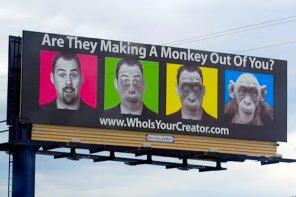Two recent events portray creationism debates in very different settings. First, Nature reports that a creationist organization in South Korea has successfully campaigned to remove references to evolution from high-school textbooks. The Society for Textbook Revise (STR) petitioned South Korea’s Ministry of Education, Science and Technology to make these revisions, and ministry allegedly deferred judgment to textbook publishers who yielded to the demands.
The petition was just one in a series of public campaigns by the creationist movement in South Korea. In 2008, for example, the Korea Association for Creation Research created an exhibition at a popular South Korean amusement park which, they claim, attracted more than 116,000 visitors in three months. More recently, the STR began an effort to publically contest evolutionary theory by highlighting scientific discord over the lineage of particular species, such as Archaeopteryx. Nature noted that this is indicative of a larger trend:
In a 2009 survey conducted for the South Korean documentary The Era of God and Darwin, almost one-third of the respondents didn’t believe in evolution. Of those, 41% said that there was insufficient scientific evidence to support it; 39% said that it contradicted their religious beliefs; and 17% did not understand the theory.
Interestingly, a recent survey of trainee teachers indicates that 40% of South Korean biology teachers agreed with the statement that “much of the scientific community doubts if evolution occurs.”
These numbers are within range of the United States, where creationism is even more popular. According to a poll released Friday by Gallup, 46% of Americans agree with the statement that “God created human beings pretty much in their present form at one time within the last 10,000 years or so.” 32% believe that human beings evolved with God’s guidance; 15% say that humans evolved and that God had no part in the process.
Gallup reports that the prevalence of this creationist view of human origins is “essentially unchanged from 30 years ago,” when Gallup first asked the question. Gallup has polled Americans to choose between these three options 11 times since 1982, and this year’s poll does not significantly diverge from the 30-year average.

Gallup also reports some unsurprising relationships between creationist views and religious affiliation, education levels, and political views. Creationism is strongly correlated with church attendance (two-thirds of weekly churchgoers subscribe to the view). Creationism is negatively correlated with education level (it is endorsed by only 25% of postgraduates, but 52% of Americans with high school educations or less). Finally, the majority of Republicans are creationists. See Gallup’s report for handy visuals of these numbers.
These reports raise some interesting questions. Why is South Korean creationism trafficking in amusement parks and public campaigns, instead of science buildings and churches? How can U.S. views remain virtually unchanged since the 1980s, despite significant political and cultural changes in the last two decades? Where should we place the 32% of respondents who agreed that humans evolved over millions of years from less advanced forms of life, but that God had some part in the process?
As Kelly Hayes demonstrated beautifully in RD last year, creationism and evolution have much in common, despite their entrenched opposition. If we isolate them to their particular claims about the origins of humanity, they seem radically opposed: one posits a single and recent act of creation, in which humans are set apart and special; another describes an extraordinarily long and unguided process that questions many assumptions that we might have about our innate specialness or our distinction from other species.
Yet creationism and evolutionary theory also have a great deal in common. Both are large, abstract, and distant narratives, which have little bearing on our everyday empirical life. We don’t see animals or plants evolving around us (unless, perhaps, we are dog breeders or observant gardeners), nor do we have any substantial access to a past moment of creation.
Furthermore, both narratives, Hayes demonstrates, are “myths,” or paradigmatic models of reality that help us code our visions of the world and inform our social vocabularies, conceptions of self, and varying personal relationships. One’s views about the origins of humanity signal special allegiance, at the moment, to a broad social collective and a general worldview. In short, whether you are a die-hard secularist or an adamant creationist, you subscribe to a large and complex narrative that you yourself could never have built alone, and which is meaningful for overlapping social, psychological, and rhetorical reasons.
How does the notion of “myths” help us understand these two recent events? First, it explains some of the surprising elements of Gallup’s polling data. The prominence of the middle position—that God exhibited subtle guidance in evolution of humans—seems to indicate that a substantial number of Americans are not comfortable affiliating with either “myth” of creation or evolution. Many Americans occupy multiple social collectives, and likely hold shifting opinions about human origins. The statement, “Human beings have developed over millions of years from less advanced forms of life, but God guided this process,” allows one to have good science without necessarily getting rid of religion. It does so by turning God into something like an invisible hand, deferred to the Big Bang or some alternate plane of existence.
Second, “myths” brings us back to South Korean amusement parks. They remind us that there is much more to culture than cold hard facts. (Otherwise, how could we have Fox News?) The popularity of a myth like creationism depends on social dynamics, publicity, and specific institutions of power. To combat it, evolution needs more than just the hard facts. It needs counter campaigns, educational efforts, and maybe even amusement parks. 



